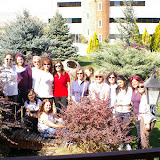



 |
| sünnet |
I recently was invited by my host counselor to attend the sünnet düğünü of his nephew. The word “sünnet” (the word used in Turkish for circumcision) is of Arabic origin and means “busy path”. In a broader sense; it refers to the path to God and the good or bad attitudes which human being adopt. Düğünü means "day of".I was initially told that it would be held at an event hall and that the boy's becoming of a man would be celebrated with the Turkish signature combination of abundant food and group dancing. Later I learned that this was a rite of passage ceremony that is among the most significant traditional procedures related to the male child in Anatolia. Circumcision is believed to be one of the features of a `heliolithic' culture about 15,000 years ago and has spread over much of the world. People speculate that it might have originated independently within several cultures depending on evidence that inhabitants of the new world and Australian aborigines were circumcised when these continents were discovered. The observation of 6,000 years old circumcised mummies point to the fact that this may be one of the oldest surgical procedure. Today although most male babies are circumcised in hospitals at birth, the celebration of sünnet düğünü is held for boys sometime between the age of 5-12 years.
Above I have included some photos of the festivities.
References:
www.turkishculture.org
www.cirp.org




